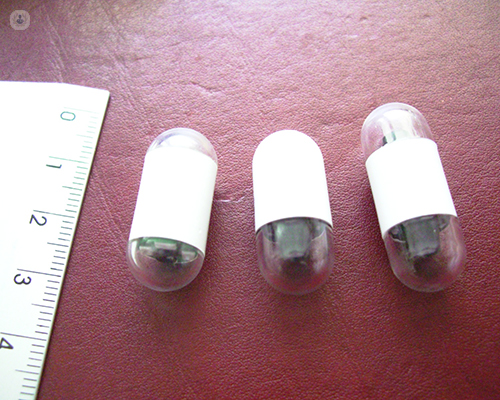Capsule endoscopy – a not-so-tough pill to swallow
Autore:The idea of swallowing a pill that then sends photographs of your digestive tract to your doctor is something straight out of the future. In actual fact though, it is a safe and effective investigation offered to many patients of Dr Andrew Fagbemi, a top paediatric gastroenterologist. This diagnostic method allows a close-up examination of the small intestine, which is a very difficult area to access, but how exactly does a capsule endoscopy work?
What is a capsule endoscopy?
A capsule endoscopy is a diagnostic procedure used to record images of the gastrointestinal tract and the small bowel. Due to the location in the digestive system of the small bowel, it is very inaccessible, for example, with an endoscopy. A capsule endoscopy provides a means to image and review the inside of the small bowel.
How does it work?
The capsule is small – about the size of a jelly bean – that contains a camera and LEDs inside so that images can be recorded as the capsule moves through your digestive tract. Ideally, the capsule is swallowed by the patient, however, if they are unable to, it can be deposited inside the stomach with an endoscope. This is often necessary for children.
A patient will usually arrive in the morning for their appointment, having fasted overnight. Once swallowed (or placed by endoscope), the patient can leave the hospital and return after approximately 6 hours. Throughout this time the capsule is taking one picture per second as it moves through the small bowel. These images are sent to a wearable recording device which the patient must wear around them for this period. Patients are requested to examine their stool over the next few days to confirm that the capsule has passed successfully. A specialist will examine the recorded images closely to determine either a diagnosis or if further tests are required. Patients can expect to hear about the results of the capsule endoscopy within a week, and often by the following day.
Why would I need one?
A capsule endoscopy provides a means to view the inside of the small bowel. A capsule endoscopy will usually be performed if disease of the small intestine is suspected. Using a capsule endoscopy, we are able to:
- Determine the cause of gastrointestinal bleeding
- See what is causing the patient abdominal pain
- Diagnose cancer
- Check for signs of inflammatory bowel disease, such as Crohn’s disease
- Screen for polyps
- Determine the cause of an iron deficiency
How do I prepare?
To prepare for a capsule endoscopy, patients must fast overnight before their appointment. When they arrive at their appointment, which is usually scheduled for the morning, the patient will undergo some bowel preparation involving laxatives. This ensures that the pathway through the small bowel is clear of debris, ensuring clear images can be taken.
What are the risks?
Capsule endoscopy is a very safe procedure with few risks. However, the main risk of a capsule endoscopy is capsule retention. This is when the patient does not successfully pass the capsule in their bowel movements in the days following their appointment. Capsule retention can put the patient at risk of bowel obstruction. If the patient has not successfully passed the capsule after a few days, providing they are not in pain, they will be asked to watch and wait for up to a week to pass the capsule. If after this time they have still not passed the capsule, they will need to have an X-ray to determine where the capsule is lodged, and then have it removed by either surgery or endoscopy. However, if the patient has not passed the capsule and they are suffering from abdominal pain as a result, it will be removed immediately, without waiting for it to be passed naturally.
People who have narrowing of the small bowel are at higher risk of capsule retention, so if this is suspected, an MRI scan or Barium meal can be taken to confirm this or not. Those who suffer from Crohn’s disease, for example, are likely to have narrowing of the small bowel.
What are the pros and cons of capsule endoscopy?
The main advantage of a capsule endoscopy is that it can give us images of a section of the digestive tract (the small bowel) that is otherwise very difficult to assess. A normal endoscopy, for example, would not be able to reach to the small intestine.
Hence, despite the images a capsule endoscopy can provide, it does not allow us to simultaneously do a biopsy of any abnormalities detected. Often a biopsy is necessary to confirm a diagnosis. Therefore, if a capsule endoscopy shows clear signs of a certain illness, but there are uncertainties about the pathology, then a biopsy would next be performed by other means. Thus, when a capsule endoscopy is used, the results with either indicate what treatment is required, or it will tell us if further tests are required.



